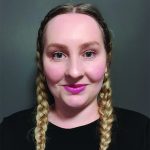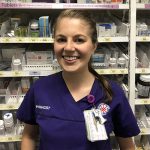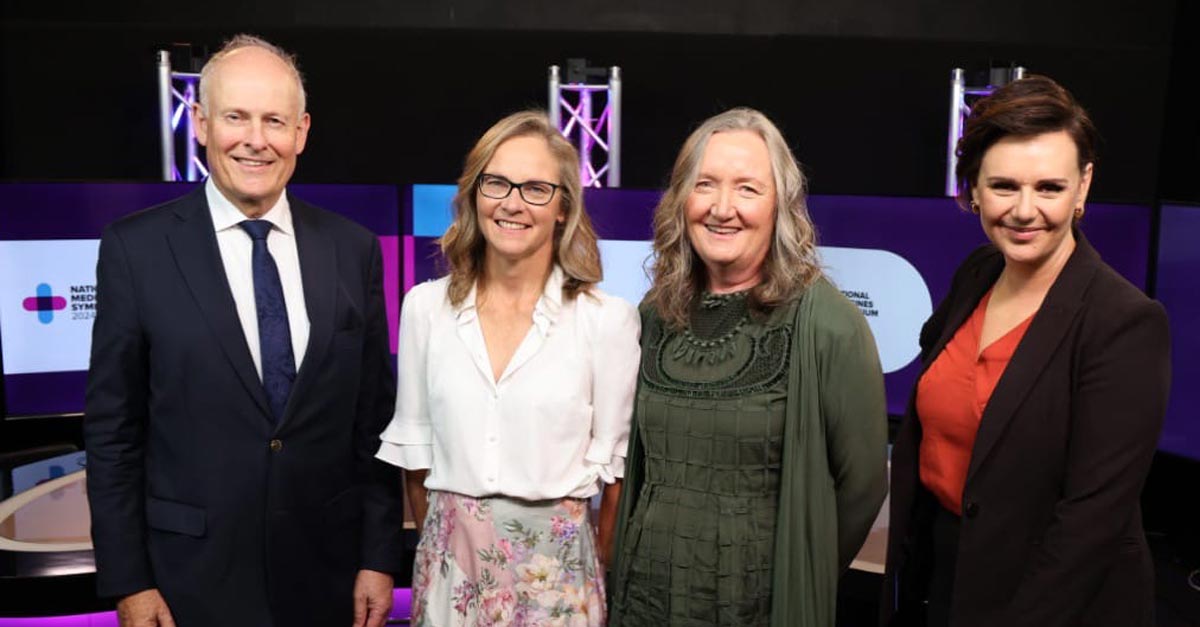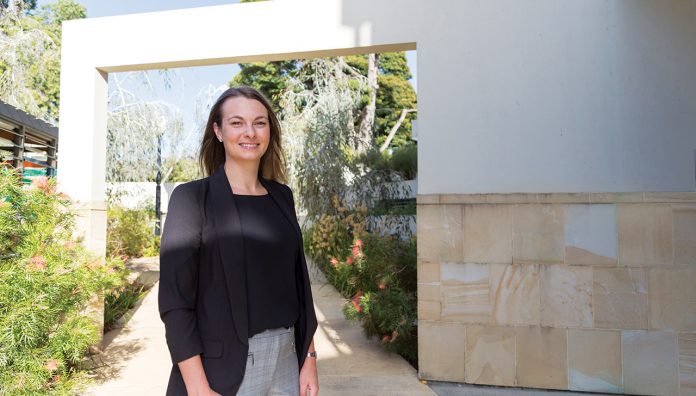Early Career Pharmacists (ECPs) are emerging as a force for change as the profession moves to the safe and quality use of medicines, practising to the full extent of their skills and recognition for providing safe, equitable healthcare.
The PSA ECP network – a cohort of pharmacists with up to 10 years’ registration, interns and students – is producing members of the profession who are stepping up as current and emerging leaders. ECPs have jumped at the chance to have their say and are growing in their understanding of the challenges facing the profession and the Australian health system.
ECPs are working hard to ensure they have the skills and experiences which not only allow them to deliver care through contemporary medicines management services, but also understand the importance of being at the table when decisions are made at a systems level.
Lauren Burton MPS, a West Australian pharmacist who in July last year became the second PSA ECP board-appointed director, says the energy is having a vitalising effect.
‘The profession is jumping on board with the positivity and the pragmatic approach that this cohort can bring.
‘Not only are they optimistic in their points of view, but also they are willing to take on new challenges and do the hard yards to demonstrate what they think pharmacy can be doing, now and into the future. ECPs are committed to realising the initiatives detailed in PSA’s Pharmacists in 2023 report.’
ECPs are also challenging perceptions about what it means to be a pharmacist and breaking down barriers, she adds.
‘Traditionally, we have been defined by where we find ourselves working – in a hospital or community pharmacy. Now, we are united by our common purpose – medicine safety and medicines management.’
Acknowledging that ECPs account for more than 60% of the profession, PSA has taken active steps to ensure ECPs have opportunities to participate in governance and leadership and are supported to undertake the skills development that will empower them.
The result is a network of connected pharmacists who work together to share ideas and experiences, as well as acting as a conduit for suggestions and feedback involves them in professional advocacy at local and national levels.
Unsurprisingly, the initiative is paying off in succession planning. Current PSA National President Associate Professor Chris Freeman is one example of a member who has risen from ECP ranks.
‘We have seen a transformation … to this really amazing, diverse and energetic group who are taking leadership positions seriously,’ Ms Burton says.
The current state and territory representatives of the PSA national ECP Working Group interviewed for this article, enthused about the opportunities for networking, mentorship and wider professional horizons.
Queensland

Queensland ECP Working Group National Representative Tegan Stark MPS says the volunteer role gives her a satisfying sense of connection with colleagues, via regular teleconferences and meet-ups.
‘You don’t realise until you sit back how many people you have met – going to the PSA national conference, making connections with the ECP group and reaching out to members who aren’t part of those groups, to make sure they are aware there are people to talk to and network with and discuss their day-to-day role.’
Isolation is a particular challenge for colleagues working in rural and remote areas, where they often fill a more multidisciplinary role than city counterparts.
‘Rural pharmacists need more recognition and support in those areas and would be well placed to take advantage of possible future reforms such as MBS provider numbers for pharmacists,’ Ms Stark says.
On PSA’s Pharmacists in 2023 report, she says ECPs are united in pushing for improved digital technology and recording to ensure better medicine safety.
‘My hope is also to see pharmacists on the MBS and recognised for the services we provide. My hope is that the next Community Pharmacy Agreement will be positive for pharmacists, with more programs and services being recognised and remunerated.
‘There are a lot of models internationally that show this model is successful. Hopefully we can see that in the next few years, at least by 2023.’
Northern Territory

Northern Territory ECP National Representative Colleen Niland MPS says the attractions of rural and remote practice are often overshadowed by the challenges of distance from family, friends and peer support.
‘But the benefits that come from working rural and remote can be huge. There’s great job satisfaction, less competition for positions and career progression, better remuneration and life experience. A lot can be gained.’
Pharmacists’ expertise is in demand in the NT, not only from Aboriginal community-controlled health organisations but a variety of other groups.
‘We have pharmacists working on remote supply contracts with community pharmacy, pharmacists flying out to remote locations to provide medicine-related services travelling thousands of kilometres to provide quality HMRs to people.
‘This kind of groundwork is building relationships of trust with patients and organisations, and it shows the kind of influence that pharmacists can have on patients and communities.’
Australian Capital Territory

ACT National Representative Olivia Collenette MPS joined her ECP group as a student, at the recommendation of her pharmacist boss. The ECP connection led her to a circle of ‘positive and inspired’ people. That was four years ago and now she also leads her ECP group.
‘I thought I could make a difference. I’d worked in pharmacy coming up to 10 years, and I could see things that needed to be changed – but you can’t change them unless you advocate for them,’ she says.
She doesn’t mind sounding ‘corny’ about her passion for continuity of care and the trust of patients.
‘I love the fact that someone will come in and say, “I’ve got to see Olivia, she knows what’s going on, she’s my person”. You grow that connection, you are their trusted person.’
Achieving better remuneration is critical for pharmacists to operate more effectively, such as in closer collaboration with the GPs and in aged care, she says.
Her group has highlighted – nationally – the need for fast progress in digital. ‘If electronic prescribing comes in this year – and they say it will – we will need to get on board,’ she says.
South Australia

Stacey Putland MPS, the South Australian National Representative for ECPs splits her time between working in aged care, community pharmacy, a local hospital, and tutoring at the University of South Australia. She’s also a passionate rural pharmacy advocate.
‘Some students fear losing their network if they “go rural”. But I’ve found almost the opposite is true. Rural pharmacy is great for expanding your interdisciplinary network and helping you build a unique professional identity,’ Ms Putland says.
‘I’m proud of the work PSA and the ECPWG is doing to make PSA membership benefits more accessible to rural pharmacists through webinars and R3ECP (Rural, Regional, Remote ECP) networks.
Ms Putland believes pharmacists play a pivotal role in medicines safety in aged care. While current funding models limit the ability for pharmacists to provide tailored support and follow up, PSA is doing some exciting work in this space.
‘I love working in aged care, where medicines management is almost always complex and you are a valued member of the interdisciplinary team.
‘Residents and their families are often grateful for the opportunity to speak with the pharmacist about medicines. I encourage ECPs to consider whether a career in aged care may be for them.’
New South Wales

Sarah Dineen-Griffin MPS, NSW’s National Representative, has some crisp advice for ECPs.
‘Avoid complacency,’ she says. ‘If you have ambitions in exploring the myriad of career pathways pharmacy offers, don’t hesitate. Apply for that job you don’t think you are qualified for. Find a mentor who inspires you, or an area you are passionate about.
‘Be open-minded and keep your ear to the ground. Become involved with professional bodies that need young and energetic pharmacists as members.’ While the blossoming of opportunities for young pharmacists has surprised her, she sees more diversity ahead.
‘We have the opportunity to better integrate into the care team, resulting in more efficiency and effectiveness in the system. For me, this will drive improvement in health outcomes, and that is what being a pharmacist is all about.’
Tasmania
 Samantha Bruce MPS, the ECP Working Party National Representative in Tasmania, has little use for talk of turf wars between doctors and pharmacists.
Samantha Bruce MPS, the ECP Working Party National Representative in Tasmania, has little use for talk of turf wars between doctors and pharmacists.
‘The doctors I have worked with collaboratively appreciate our skills and are glad of our advice,’ she says.
She has worked rurally as a community pharmacy manager and appreciated being recognised as part of a healthcare team, experience that helped her move back to a managerial job in a Hobart hospital pharmacy.
‘Now, in the hospital, it’s even more collaborative and being a valued member of the team.’
At university her cohort was told they were part of the future of pharmacy. Tasmania has also pioneered Australia’s first real-time prescription monitoring service, and serves as a predictor of the impacts of the ageing of society, with its high ratio of geriatric patients.
‘I think ECPs should put themselves out there … to get to know the doctors in their area, and help complement what they are doing.’
Victoria

Victorian National Representative Esa Chen MPS values PSA’s role in raising the profession’s profile across the health sector.
‘I think a lot of people – including (PSA) members – don’t know what a good job they’re doing.’
Among her research interests, the University PhD candidate is investigating how to improve medication management for residents in aged care. It’s an area that underscores the need for funding and teaching evidence-based practice.
‘It’s really important for us as early career pharmacists firstly to know where to find the evidence. It’s important that we invest in creating the evidence and then translating it to make sure that what we find actually gets delivered to the community,’ Ms Chen says.
‘I think a lot of the evidence for pharmacists being effective comes from case-based approaches, where pharmacists have been able to access the care team and contribute to the care team.’
She is optimistic that younger health professionals will not only work together more closely but do more to address problems of inequity in health care.
‘We are coming up in a society that is aware of these issues.’
Western Australia

As a hospital pharmacist at Perth’s Sir Charles Gairdner Hospital, Jo Armstrong MPS enjoys her role as WA’s ECP Working Party National Representative because it enables her to share the voice of her group with PSA and contribute to its strategic direction. Her role also allows insight into the developments and activities of pharmacists in other states.
‘I would love for pharmacists to be present at all transitions of care,’ Ms Armstrong says, ‘as this will help provide the best care for our patients in preventing medicine-related harm. Communication at these critical transitions is essential to ensure medicines are used in the safest possible way.’
It is important, she feels, that ECPs lead in the uptake and utilisation of digital technologies to optimise medicine safety.
‘Pharmacists, and in particular ECPs, are key players when it comes to modern digital health records, dispensing technologies and electronic medication management systems. It is an exciting time to be a pharmacist.’
To learn more about PSA’s Early Career Pharmacists network, click here.



 National Medicines Symposium 2024 speakers (L to R): Steve Waller, Professor Jennifer Martin, Professor Libby Roughead, Tegan Taylor[/caption]
National Medicines Symposium 2024 speakers (L to R): Steve Waller, Professor Jennifer Martin, Professor Libby Roughead, Tegan Taylor[/caption]


 This CPD activity is sponsored by Reckitt. All content is the true, accurate and independent opinion of the speakers and the views expressed are entirely their own.[/caption]
This CPD activity is sponsored by Reckitt. All content is the true, accurate and independent opinion of the speakers and the views expressed are entirely their own.[/caption]







